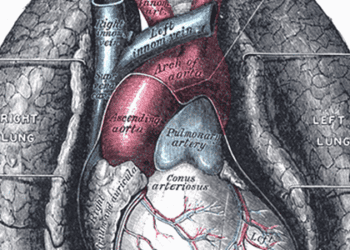Childhood emotional neglect associated with increased risk of cerebral infarct over lifetime
Image: CC/Hellerhoff
Key study points:
1. Higher childhood adversity scores were associated with a higher likelihood of cerebral infarcts with a 2.20 fold higher risk of infarct in those with moderately high levels of adversity compared to those with moderately low levels.
2. Emotional neglect was the most important determinant of cerebral infarction risk and high levels of emotional neglect were associated with a 2.83 fold increase in likelihood of infarction.
Primer: In answering the age-old debate of nature versus nurture, numerous studies have suggested that nurture and in particular, adverse childhood experiences, may play a significant role in both physical and mental health in adulthood. Children who were exposed to abuse, violence, drug use, suicide or criminal behaviors in their homes were had a higher probability of engaging in risky behaviors in adulthood, including drug or alcohol abuse, suicide, smoking, having multiple sexual partners, and physical inactivity. Further, children who were raised in a socially disadvantaged setting were at had increased rates of all-cause mortality, with particularly high rates of cardiovascular disease and congestive heart failure related deaths. However, while many observational studies have established the link between childhood adversity and cardiovascular health, there is a dearth of studies addressing any connection that may exist between negative childhood experiences and cerebrovascular events. Published research addressing stroke risk in children of abuse and neglect has been largely inconclusive, often due to the lack of statistical power stemming from the relative rarity of stroke events in the study populations. The authors of this study sought to address the gaps in the current knowledge by investigating the association between adverse childhood experiences and cerebral infarctions found at autopsy.
Background reading:
This [retrospective cohort] study: Data from 192 individuals participating in the Rush Memory and Aging Project, a longitudinal clinical and pathological cohort study, were used for this investigation. Information regarding adverse childhood experiences was gathered from a 16-item survey that assessed self-reported emotional and physical trauma during the first 18 years of life. Further, demographic information regarding each individual, including age, gender, and education were gathered. Upon death, autopsies were conducted on the brains of the study participants, assessing for evidence of micro- and macro-infarcts. Data analysis revealed:
1. Higher childhood adversity scores were associated with higher likelihood of cerebral infarction (OR=1.10, CI: 1.05-1.15) on autopsy.
2. Emotional neglect was the most important adverse factor correlated with likelihood of infarction – a moderately high level of emotional neglect was associated with a 2.85-fold (CI: 1.95-4.09) increase in risk of infarction. This increased risk remained true even after controlling for cerebrovascular risk factors including diabetes mellitus, physical activity, smoking, BMI, and systolic and diastolic blood pressures. Further, the association between emotional neglect and cerebral infarction remained unchanged even after controlling for possible confounding factors such as socioeconomic status and anxiety/neuroticism.
In sum: Adverse childhood exposures, particularly the experience of emotional neglect, are associated with increased risk of cerebrovascular events in adulthood. The authors theorize that perhaps childhood environments deficient in emotional nurturing do not provide the necessary factors for proper neural development, thus placing these children at increased risk for developing psychiatric, cognitive, and cerebrovascular disorders in adulthood. K.M. Barrett and J.F. Meschia discussed a possible mechanism for this in the accompanying editorial where the authors propose the theory that childhood trauma may result in shorted telomere length, which has been associated with increased stroke risk. However, as both the study and editorial authors noted, more research is needed to clarify the basis of this association between childhood exposure and cerebrovascular changes. The study faces several limitations. First, the individuals studied were the first 192 participants to die and receive a brain autopsy, thus it is unclear whether the findings from this select group are generalizable to the larger population. Second, because childhood events were studied using a retrospective survey, the results may be influenced by recall bias. Finally, it remains unclear whether adverse childhood experiences are associated with cerebral infarcts specifically or with vascular deaths in general.
Click to read the study in Neurology
Written by [MK]
© 2012 2minutemedicine.com. All rights reserved. No works may be reproduced without written consent from 2minutemedicine.com. DISCLAIMER: Posts are not medical advice and are not intended as such. Please see a healthcare professional if you seek medical advice.




